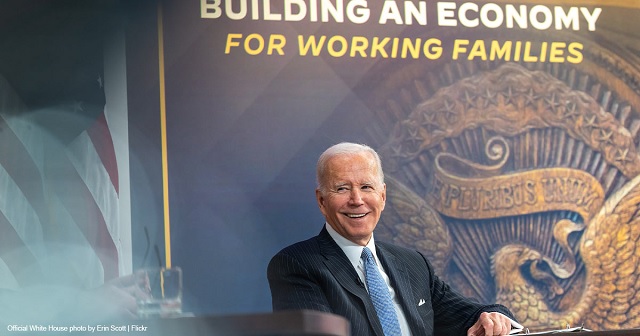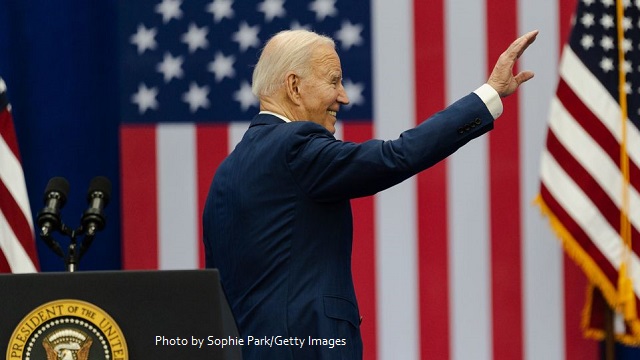
President Joe Biden released his proposed 2025 budget on Monday. “As the president is fond of saying, a budget is a reflection of our values,” said Senator Sheldon Whitehouse (D-R.I.) at Senate hearings on the multi-trillion-dollar proposal. But Biden’s proposed budget would:
- Place transgender-identifying minors into the foster care facilities of the opposite sex, a policy that has led to sexual abuse and human trafficking;
- Deny most Americans, especially Christians, the right to participate in foster care for certain children unless they agree to subject those minors to transgender medical interventions, such as puberty blockers and cross-sex hormone injections;
- Seek to expand abortion;
- Overturn laws that punish prostitutes for knowingly infecting others with HIV/AIDS;
- Eliminate abstinence-based sex education;
- Spike funding for Title X, a program that encourages doctors to give contraception to underage minors without parental knowledge and conceal children’s sexual activity from their parents;
- Entrust government-funded workers with raising children beginning at the age of three; and
- Increase funding for controversial, United Nations population programs.
Below is an overview of the budget’s most controversial features in his 2025 budget, which would raise taxes by more than $5 trillion, spend more than $8.6 trillion, enact a constitutionally-dubious wealth tax, implement a global minimum tax, and add $16.3 trillion to the national debt over the next 10 years.
Promoting Extreme Transgender Ideology
Joe Biden has repeatedly committed his administration to promoting the LGBTQ agenda. The Biden administration’s proposed 2025 budget intends to make the LGBTQ revolution permanent by placing children in sex-segregated group homes of the opposite sex, and by denying Christians the right to participate in aspects of foster care.
Buried in Table S-6, on page 153 of the budget (page 157 of the PDF), is a line item committing to “[p]revent and combat religious, sexual orientation, gender identity, gender expression, or sex discrimination in the child welfare system.”
That apparently refers to a proposed rule the Biden administration issued last September requiring the foster care system to place LGBTQ-identifying children with “safe and appropriate” homes — homes that agree to facilitate a child’s social and medical “gender transition.” The rule would “require specific steps before the placement of transgender, intersex, and gender non-conforming children in sex-segregated child-care institutions (CCIs),” specifically that they place children and teens in foster care facilities according to their gender identity. That is, the Biden administration intends to place children who say they identify as transgender into sex-segregated foster care facilities of the opposite sex. Rep. Jason Smith (R-Mo.), chairman of the Ways and Means Committee, pointed out this would open the beds and showers of female foster homes to teenage boys.
Such a policy has already led to tragic results. In Virginia, a 14-year-old girl named Sage began to identify as a boy. Police found the teen after she ran away and got sexually trafficked, but instead of returning her to her home, a judge accused her custodial grandparents of “emotional and physical abuse” by “misgendering” her. Sage was placed in the male section of a foster home, where she was beaten and given drugs. She then ran away again, where she was apprehended by a human trafficking ring in Texas, where she was “drugged, raped, beaten, and exploited.”
The definition of “safe and appropriate” also excludes anyone who expresses skepticism about exposing children to transgender procedures. Christians and anyone who shows “hostility” toward the LGBTQ agenda would be deemed unsafe to foster children who identify as transgender. Similar policies have already denied Christians the right to care for children in Oregon and Massachusetts. This issue stood at the heart of a 2021 Supreme Court ruling, Fulton v. City of Philadelphia, which ruled the city’s policy against contracting with Catholic Social Services because of their religious beliefs “violates the First Amendment,” specifically the Free Exercise Clause. The rule attempts to sidestep this concern by saying Christians can still care for foster children, just not those who identify as LGBTQ.
Multiple U.S. senators expressed concerns with the language of the rule at the time. “We are fighting back against the Biden Administration’s woke gender ideology and pronoun politics,” said Senator Roger Marshall (R-Kan.) “Their new proposed rule aims to exclude faith-based foster care providers from helping children in need.” A coalition of 19 state attorneys general also raised alarms about the policy’s unconstitutional, and religiously discriminatory, language.
To justify these policies, the Biden rule falsely asserts, “when a LGBTQI+ child has their identity respected and supported by the caregivers in their life, their risks of attempted suicide decrease dramatically.” Yet a host of studies, from around the world over multiple decades, have found that transgender procedures do not help, and may harm, those who undergo them. A 2021 study in the Journal of Urology found, “The overall rates of suicide attempts doubled” among trans-identifying men “after vaginoplasty,” commonly referred to as “bottom surgery.” The budget indicates Biden is doubling down on this rule and its flawed methodology.
Abortion
In releasing the 2025 proposed budget, the “Biden-Harris [a]dministration has taken action to protect and expand access to reproductive health care, including abortion and contraception,” said HHS Secretary Xavier Becerra, “in every way possible.”
The budget spreads misinformation while announcing the administration’s intention to expand abortion in all 50 states. “Twenty-seven million women of reproductive age — more than one in three — live in one of the 21 [s]tates with an abortion ban currently in effect. In the last year, women have been denied medical care needed to preserve their health and save their lives,” the budget asserts. In fact, no state bans abortion if the pregnancy threatens the life of the mother. Pro-life advocates say doctors may have been confused specifically because abortion industry lobbyists have repeatedly claimed “miscarriage care” is illegal.
After touting Biden’s actions on behalf of the abortion industry, the budget states, “The [a]dministration continues to call on the Congress to pass legislation restoring the protections of Roe v. Wade in [f]ederal law.” The Biden administration endorses the so-called Women’s Health Protection Act, which goes well beyond Roe.
In concrete terms, the budget proposes giving $390 million to the “family planning” services of Title X, a 36% hike. As this author exposed, training sessions funded by the Biden administration encourage Title X providers to talk about sex with minors behind parents’ backs, hide minor children’s sexual activity from parents both during live conversations and in medical records, and even to have vans roam neighborhoods giving minors federally funded contraceptives.
The budget also “provides $594 million, an increase of $37 million above the 2023 level, for USAID directed high-impact and lifesaving voluntary family planning and reproductive health programs and America’s voluntary contribution to the United Nations Population Fund,” the budget states. UNFPA was long complicit in forced abortions necessitated by China’s one-child policy and remains tied to controversial population control efforts worldwide.
The abortion lobby said the proposed budget proved the Democratic administration is enacting their values. “The Biden-Harris administration is fighting by our side,” said Mini Timmaraju, CEO of Reproductive Freedom for All (formerly NARAL). “[T]his budget is proof. We look forward to partnering with our allies in the White House and Congress to pass a budget where our values are reflected.” Planned Parenthood also greeted the budget as “an encouraging sign of their continued support for sexual and reproductive health care.”
Universal Pre-K
As he did in last year’s $6.9 trillion budget proposal, Joe Biden proposed offering “free” preschool to children beginning at age four and “charting a path” to expanding the program to three-year-olds. The program is a longstanding item on the Left’s wish list, constituting a part of Elizabeth Warren’s 2020 presidential campaign, Hillary Clinton’s 2016 campaign, mentioned in Barack Obama’s 2013 State of the Union address, and referenced in Obama’s 2010 report to the UN Human Rights Council. Yet children being raised by daycare are associated with a panoply of negative outcomes for children and, polls show, is unwanted by parents, especially mothers.
Fighting Laws against Spreading AIDS, Combatting ‘Hate Crimes’
The 2025 proposed budget continues President Joe Biden’s fixation on overturning state laws designed to prevent AIDS-infected prostitutes from spreading HIV. “The Budget further supports State and local efforts to promote equity and protect civil rights by including $10 million for a new initiative to modernize outdated criminal statutes with a discriminatory impact on HIV-positive individuals … and $50 million for programs to combat hate crimes.”
The Biden administration sued the state of Tennessee over its aggravated prostitution law (§ 39-13-516), which charges anyone who knowingly sells sex while HIV-positive with a felony. The lawsuit came as the administration is negotiating the World Health Organization’s Pandemic Agreement. In January, WHO Secretary-General Tedros Ghebreyesus instructed “[p]olitical leaders at all levels” to “counteract conservative opposition” and “enact progressive laws” championing “sexual rights.” Specifically, “Countries must repeal laws that criminalize homosexuality, sex work and HIV transmission.”
Ending Abstinence-Based Education
The Biden budget would end funding for the Sexual Risk Abstinence Education program. Instead, he would give $101 million for the Teen Pregnancy Prevention program, despite a 2015 survey which found 40% of teenagers said these classes made them feel pressured to have sex. The Department of Health and Human Services lists eight regional Planned Parenthood alliances among the current Teen Pregnancy Prevention grant recipients.
AUTHOR
Ben Johnson is senior reporter and editor at The Washington Stand.
RELATED ARTICLES:
America’s Economic Checkup Doesn’t Look Good
Military Bill Expands IVF Services to Gay and Transgender Servicemembers
Survey Shows Support for Same-Sex Marriage Declining
Kansas Judge Prohibits Sex-Changes on State IDs, Arkansas May Be Next
England Bans Puberty Blockers for Minors
Former Lance Armstrong Prosecutor Says Men in Girls’ Sports Offers 10 Times the Edge of Doping
Biden Giving Sanctuary New York City Over $100 Million in Aid for Migrants
EDITORS NOTE: This Washington Stand column is republished with permission. All rights reserved. ©2024 Family Research Council.
The Washington Stand is Family Research Council’s outlet for news and commentary from a biblical worldview. The Washington Stand is based in Washington, D.C. and is published by FRC, whose mission is to advance faith, family, and freedom in public policy and the culture from a biblical worldview. We invite you to stand with us by partnering with FRC.















